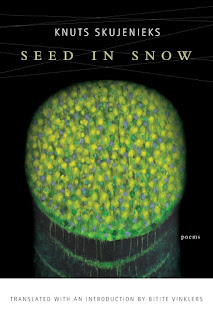Līga Horgana is back with a literature review of Seed in Snow, a collection of poems written by Knuts Skujenieks and translated by Bititie Vinklers.
Someday we may not exist.
But yesteryears’s snow will live,
And yesteryear’s light
Will fly on,
Reaching a distant planet and heart
Transformed as today.
Soon we may not exist.
More precisely, we will.
Our words may decay, our portraits yellow,
But a snowy evening will find other lips,
Other shoulders,
And other lanterns.
And all of them will be ours.
More precisely, we will exist.
Forever and ever.
Without amen. (137)
These are words of the recently departed Knuts Skujenieks that poignantly close his poetry collection Seed in Snow, translated by Bitite Vinklers into English. His name will always be remembered in Latvian literature as one of the greatest poets, a literary critic, and a polyglot who translated works into Latvian from over than10 languages.
Born in 1936, his mother soon passed away, requiring Skujenieks and his brother to move in with their grandparents in the countryside. His first poem was published in 1950, which is right around the time he first became interested in translating. Although he began studies at the Faculty of History and Philology in Riga, he never finished, and instead moved to Moscow to study at The Maxim Gorky Literature Institute, where he met a lot of other writers of his time. Just a year after graduating, he was arrested for alleged anti-Soviet activities and sent to a work camp in Mordovia for seven years. These seven years was the time when his most significant poetry was written: a body of work that would be released in a collection called Sēkla sniegā (Seed in Snow) in 1990 – the year when the Republic of Latvia declared its renewed independence.
In 2016, Seed in Snow, Poems by Knuts Skujenieks was released by BOA editions, made up of 52 poems mostly from the 1990 collection that were translated by Bitite Vinklers. It is a bilingual work that gives a chance to see the original Skujenieks’ written text in Latvian as well as the English translation. In the introduction of the book, Vinklers points out that labor camp was ironically the place where Skujenieks found his creative freedom, quoting his speech at the 1996 PEN conference in Prague on “The Prison in Literature and Literature in Prison”: “I have maintained, and maintain that my poetry of that time is not ‘gulag poetry’ but poetry written in the gulag. I tried to neutralize the elemental imprisonment existence, universalize it, include it in a broader historical context…” (9)
In a poem inspired by a little note found in labor camp in some handbook for learning Swhali, Skujenieks writes:
My friend is back in place:
My knife.
Those who seemed not to know me
Will know me again.
This morning the sun appeared
Splendid as before,
And I slice the world like an apple –
In half.
Today is again a day
Never encountered before,
And today as never before
An old scar begins to ache.
You will ring and sing, my friend,
Wherever you are sent:
For to tell the truth,
My knife is in my head.
My knife is in my mouth.
My knife is in my breast. (107)
I could use four words to describe these poems: time, nature, roots, and strength. They are about the flow of time — from morning to night, or winter to fall, or from youth to old age — that never stops and unites people with nature, or with their ancestors, or with the homeland they have lost. It leads to the revelation that a man is a part of it all, and he is strong, and he will survive. Skujenieks writes in the poem “The sun has descended”:
The sun has descended into marshland moss;
Birds have echoed the evening’s taps.
As I wait for the hour of freedom,
I talk with Mordovia’s birches.
On this tranquil Sabbath eve
The guards shout and carouse,
The birches rustle—their branches hung
With fairy tales and dreams.
Night, timid and cautious,
Slips in through the iron-thorn gate;
The birches gleam like white-shirted men—
Friendly, faithful, strong.
It seems, as I walk the long imprisonment roads,
I have never been exiled:
I’ve only been talking with birches awhile,
As if with gray-headed Latvian plowmen. (103)
If you are interested in learning more about Skujenieks and his work, I highly recommend checking out the multimedia homepage https://www.knutsskujenieks.lv/en where you can read about the author and listen to recordings of him reading his poetry. This includes some poems from Seed in Snow such as “Uzrakstīts augustā” (“Written in August”) and “Ziemas vakars” (Winter Evening).
Make sure to press "subscribe" at the top of the page to know when every new literature review and other great articles about Latvia will be released, and like us on Facebook for important stories of the day each evening!

Comments
Post a Comment